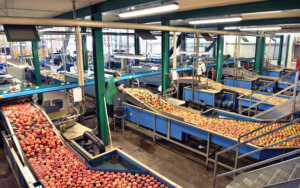Without proper protocols in place, the food that enters and departs from your food processing facility can be an invitation for an all-you-can-eat buffet to all the pests in town. That doesn’t have to be the case, though.
 The FDA conducts thorough facility inspections and produces comprehensive records for every food processing facility. However, there’s no reason to dread these food safety audits when you maintain a clean and pest-free environment inside and outside of your facility. Audits can be extremely helpful in providing a concrete snapshot of your business’s practices, showing where your facility excels and where there’s room for improvement.
The FDA conducts thorough facility inspections and produces comprehensive records for every food processing facility. However, there’s no reason to dread these food safety audits when you maintain a clean and pest-free environment inside and outside of your facility. Audits can be extremely helpful in providing a concrete snapshot of your business’s practices, showing where your facility excels and where there’s room for improvement.
Integrated Pest Management (IPM) is an effective and environmentally sensitive combination of practices used to solve pest problems while minimizing risks to people and the surrounding environment. It focuses on the long-term prevention of pests through a combination of techniques. When done correctly, these methods can be cost-efficient and effective. The principles of IPM include:
- Identify pests, their hosts, and beneficial organisms
- Establish monitoring guidelines
- Establish an action threshold for pests
- Evaluate and implement control tactics
- Monitor, evaluate, and document all results
Get your facility audit-ready with this IPM checklist:
Set Action Thresholds
Before taking any action, set up a threshold, a point that indicates it’s time for pest control. This means that seeing just one single pest does not mean there’s a full-blown problem but that it is time to do some investigating.
Involve employees
Making sure your staff is trained but also accountable for monitoring a pest-free environment will give them the confidence needed when an auditor comes inspecting. Your employees will be able to answer questions about the daily processes and will appear knowledgeable about the steps in place.
Check before entering
If your facility has ongoing pest management, audits won’t be as scary. It’s best to assign an employee to check containers with certain ingredients like grains, meals, nuts, and other raw ingredients entering your facility. If pests are found, these products won’t continue into your facility. That will protect other stored products from being contaminated.
Keep it clean
Pests aren’t just attracted to the food you’re processing; they will also find their way into your breakrooms and bathrooms. That’s why all employees should clean up after every meal, wiping down counters and sweeping floors. Rodents are particularly attracted to dark, moist areas so ongoing maintenance such as fixing leaks and wiping up excess water in bathrooms can be helpful.
Check for cracks
Using IPM means looking at environmental factors that affect (or enhance) a pest’s ability to thrive. Caulking cracks to keep insects or rodents from entering a building is an imperative step to keep food facilities pest-free.
Document everything
 When food auditors enter your facility, one thing is certain: they will want to see a well-documented Food Safety Plan. If you find your staff having to scramble to prepare for an audit, then there is room for improvement on day-to-day operations. Performing an internal audit will help you be prepared for audits and inspections from outside agencies.
When food auditors enter your facility, one thing is certain: they will want to see a well-documented Food Safety Plan. If you find your staff having to scramble to prepare for an audit, then there is room for improvement on day-to-day operations. Performing an internal audit will help you be prepared for audits and inspections from outside agencies.
The more you know about the regulations and standards in your industry, the more likely that you’ll be audit-ready. And once monitoring, identification, and action thresholds indicate that pest control is required and preventive methods are no longer effective or available, IPM programs then evaluate the proper control method both for effectiveness and risk.
Western Pest Services offers Integrated Pest Management solutions for your business, complete with operational audits and on-site staff training to catch pest introductions before they become infestations. Our Board Certified Entomologists and Food Safety Specialists receive relevant training and certifications for the food processing industry to ensure we’re providing first-class pest management services for your facility.